The 'Flying Man' Argument: Soul, Self, and Human Being
VerifiedAdded on 2022/09/09
|8
|2332
|28
Essay
AI Summary
This essay undertakes an analysis of Avicenna's "Flying Man" argument, exploring its claims concerning the soul, self, and human being, and contrasting them with the views of Aquinas. It examines Avicenna's philosophical interpretation of self-awareness, self-knowledge, and consciousness through his thought experiment, which posits a scenario where an individual, suspended in space and unable to perceive their body, can still affirm their essence. The essay delves into Avicenna's metaphysical argument, focusing on the relationship between the soul, self, and body, and the concepts of essence and existence. It also explores Aquinas's perspective, which views the soul as the internal principle explaining a creature's existence, and compares it to Avicenna's more theoretical approach. The analysis highlights the differing conclusions of these philosophers, emphasizing Avicenna's reliance on essence and Aquinas's emphasis on biological perspectives to understand the human soul. Ultimately, the essay concludes that, while both philosophers grappled with the nature of the soul, their interpretations and explanations significantly diverged. The essay also includes references from the course materials and other sources related to the topic.
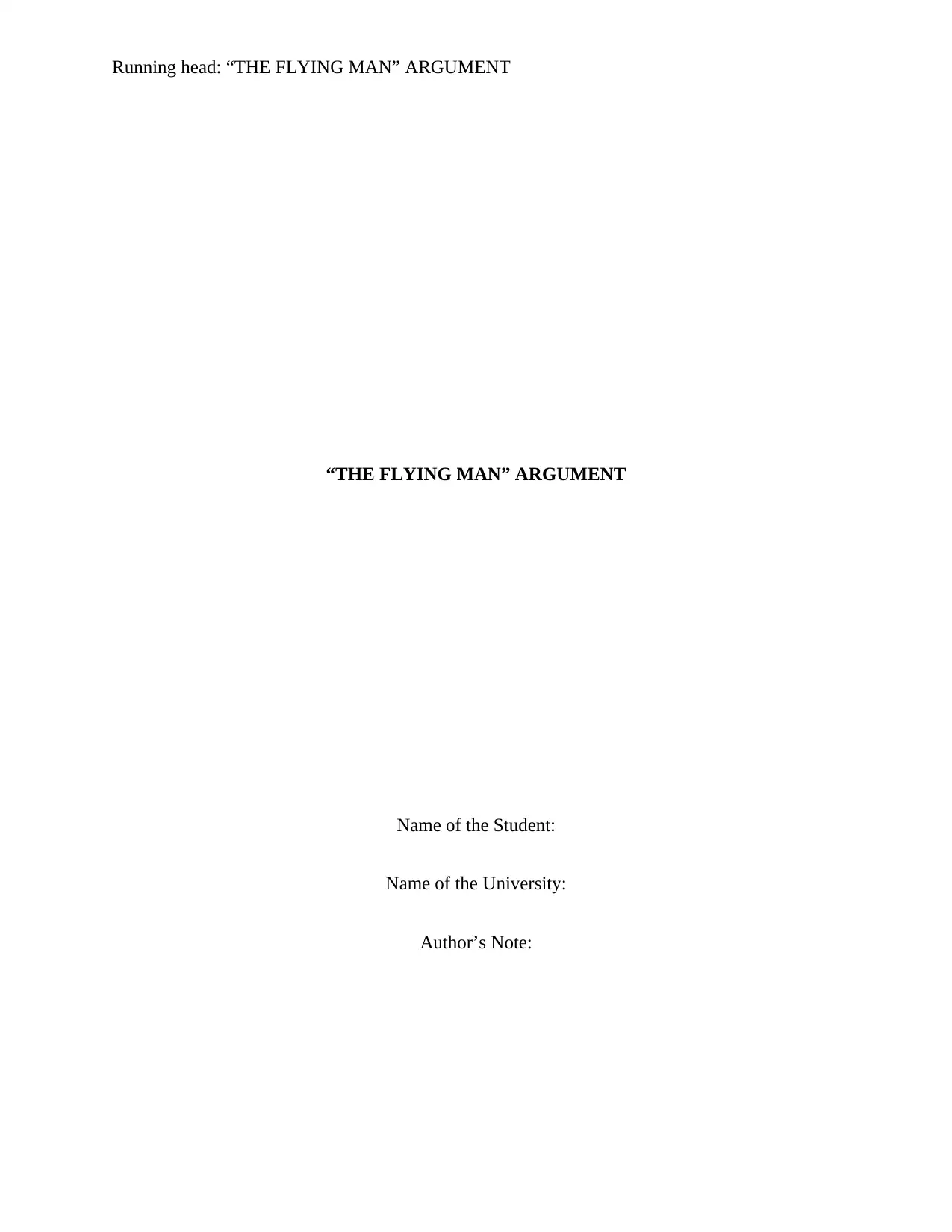
Running head: “THE FLYING MAN” ARGUMENT
“THE FLYING MAN” ARGUMENT
Name of the Student:
Name of the University:
Author’s Note:
“THE FLYING MAN” ARGUMENT
Name of the Student:
Name of the University:
Author’s Note:
Paraphrase This Document
Need a fresh take? Get an instant paraphrase of this document with our AI Paraphraser
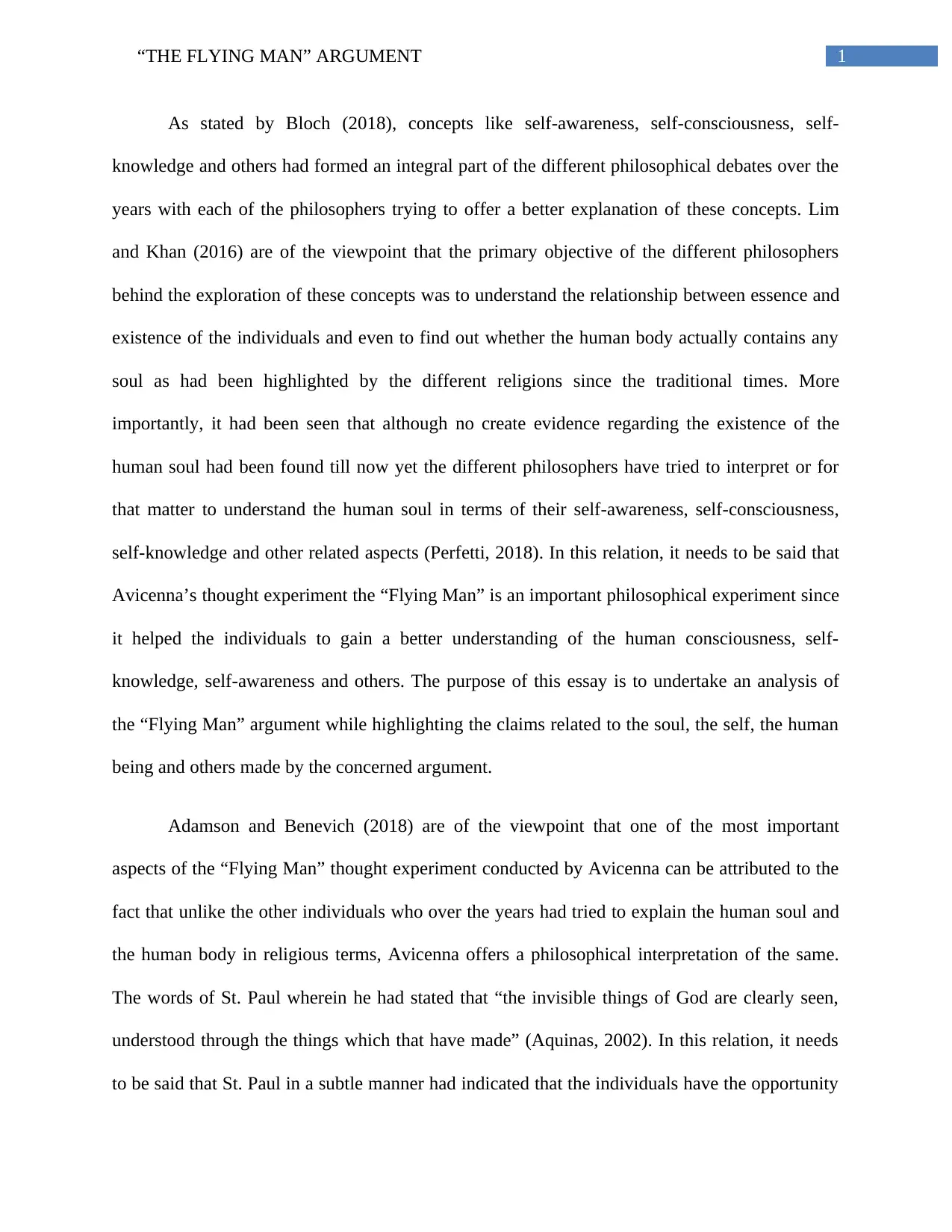
1“THE FLYING MAN” ARGUMENT
As stated by Bloch (2018), concepts like self-awareness, self-consciousness, self-
knowledge and others had formed an integral part of the different philosophical debates over the
years with each of the philosophers trying to offer a better explanation of these concepts. Lim
and Khan (2016) are of the viewpoint that the primary objective of the different philosophers
behind the exploration of these concepts was to understand the relationship between essence and
existence of the individuals and even to find out whether the human body actually contains any
soul as had been highlighted by the different religions since the traditional times. More
importantly, it had been seen that although no create evidence regarding the existence of the
human soul had been found till now yet the different philosophers have tried to interpret or for
that matter to understand the human soul in terms of their self-awareness, self-consciousness,
self-knowledge and other related aspects (Perfetti, 2018). In this relation, it needs to be said that
Avicenna’s thought experiment the “Flying Man” is an important philosophical experiment since
it helped the individuals to gain a better understanding of the human consciousness, self-
knowledge, self-awareness and others. The purpose of this essay is to undertake an analysis of
the “Flying Man” argument while highlighting the claims related to the soul, the self, the human
being and others made by the concerned argument.
Adamson and Benevich (2018) are of the viewpoint that one of the most important
aspects of the “Flying Man” thought experiment conducted by Avicenna can be attributed to the
fact that unlike the other individuals who over the years had tried to explain the human soul and
the human body in religious terms, Avicenna offers a philosophical interpretation of the same.
The words of St. Paul wherein he had stated that “the invisible things of God are clearly seen,
understood through the things which that have made” (Aquinas, 2002). In this relation, it needs
to be said that St. Paul in a subtle manner had indicated that the individuals have the opportunity
As stated by Bloch (2018), concepts like self-awareness, self-consciousness, self-
knowledge and others had formed an integral part of the different philosophical debates over the
years with each of the philosophers trying to offer a better explanation of these concepts. Lim
and Khan (2016) are of the viewpoint that the primary objective of the different philosophers
behind the exploration of these concepts was to understand the relationship between essence and
existence of the individuals and even to find out whether the human body actually contains any
soul as had been highlighted by the different religions since the traditional times. More
importantly, it had been seen that although no create evidence regarding the existence of the
human soul had been found till now yet the different philosophers have tried to interpret or for
that matter to understand the human soul in terms of their self-awareness, self-consciousness,
self-knowledge and other related aspects (Perfetti, 2018). In this relation, it needs to be said that
Avicenna’s thought experiment the “Flying Man” is an important philosophical experiment since
it helped the individuals to gain a better understanding of the human consciousness, self-
knowledge, self-awareness and others. The purpose of this essay is to undertake an analysis of
the “Flying Man” argument while highlighting the claims related to the soul, the self, the human
being and others made by the concerned argument.
Adamson and Benevich (2018) are of the viewpoint that one of the most important
aspects of the “Flying Man” thought experiment conducted by Avicenna can be attributed to the
fact that unlike the other individuals who over the years had tried to explain the human soul and
the human body in religious terms, Avicenna offers a philosophical interpretation of the same.
The words of St. Paul wherein he had stated that “the invisible things of God are clearly seen,
understood through the things which that have made” (Aquinas, 2002). In this relation, it needs
to be said that St. Paul in a subtle manner had indicated that the individuals have the opportunity
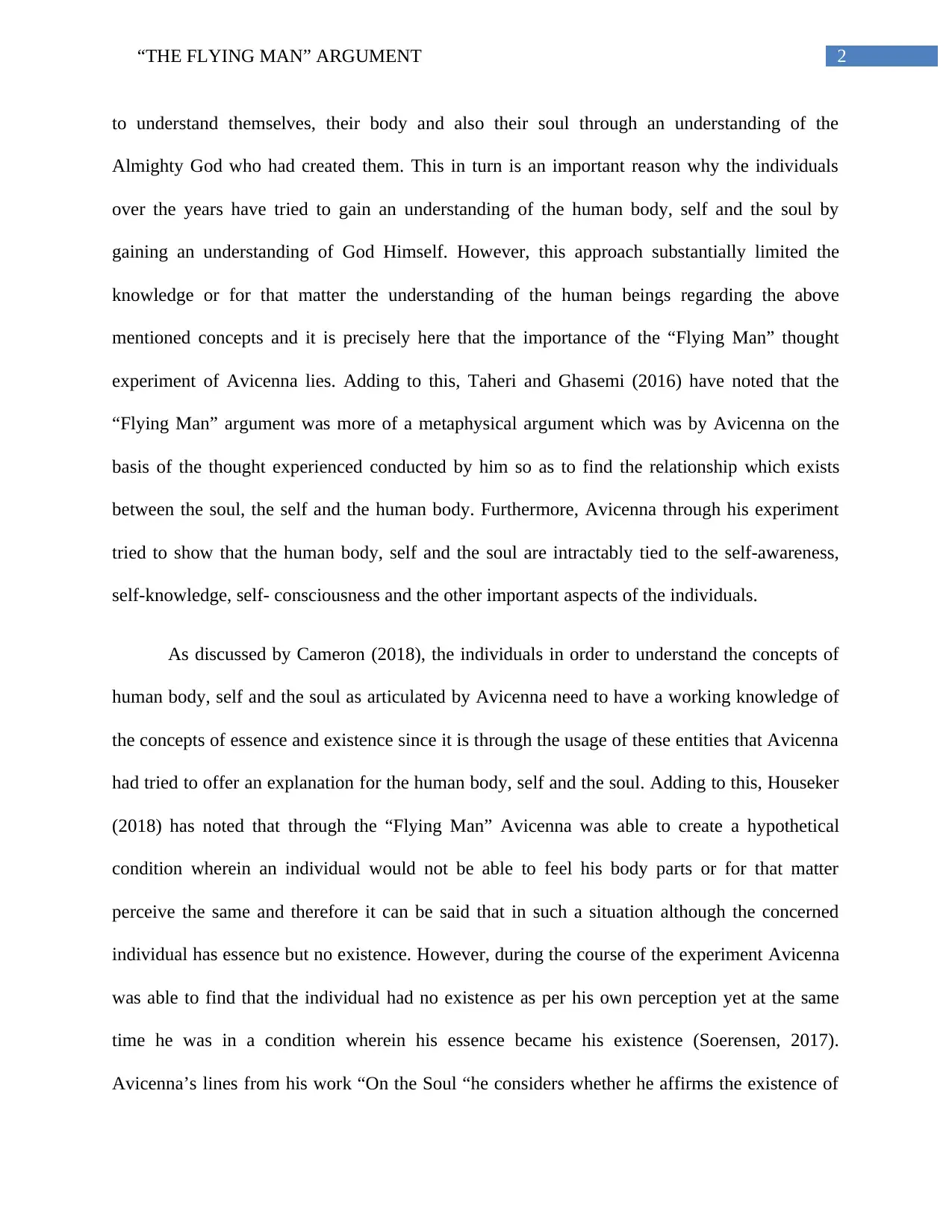
2“THE FLYING MAN” ARGUMENT
to understand themselves, their body and also their soul through an understanding of the
Almighty God who had created them. This in turn is an important reason why the individuals
over the years have tried to gain an understanding of the human body, self and the soul by
gaining an understanding of God Himself. However, this approach substantially limited the
knowledge or for that matter the understanding of the human beings regarding the above
mentioned concepts and it is precisely here that the importance of the “Flying Man” thought
experiment of Avicenna lies. Adding to this, Taheri and Ghasemi (2016) have noted that the
“Flying Man” argument was more of a metaphysical argument which was by Avicenna on the
basis of the thought experienced conducted by him so as to find the relationship which exists
between the soul, the self and the human body. Furthermore, Avicenna through his experiment
tried to show that the human body, self and the soul are intractably tied to the self-awareness,
self-knowledge, self- consciousness and the other important aspects of the individuals.
As discussed by Cameron (2018), the individuals in order to understand the concepts of
human body, self and the soul as articulated by Avicenna need to have a working knowledge of
the concepts of essence and existence since it is through the usage of these entities that Avicenna
had tried to offer an explanation for the human body, self and the soul. Adding to this, Houseker
(2018) has noted that through the “Flying Man” Avicenna was able to create a hypothetical
condition wherein an individual would not be able to feel his body parts or for that matter
perceive the same and therefore it can be said that in such a situation although the concerned
individual has essence but no existence. However, during the course of the experiment Avicenna
was able to find that the individual had no existence as per his own perception yet at the same
time he was in a condition wherein his essence became his existence (Soerensen, 2017).
Avicenna’s lines from his work “On the Soul “he considers whether he affirms the existence of
to understand themselves, their body and also their soul through an understanding of the
Almighty God who had created them. This in turn is an important reason why the individuals
over the years have tried to gain an understanding of the human body, self and the soul by
gaining an understanding of God Himself. However, this approach substantially limited the
knowledge or for that matter the understanding of the human beings regarding the above
mentioned concepts and it is precisely here that the importance of the “Flying Man” thought
experiment of Avicenna lies. Adding to this, Taheri and Ghasemi (2016) have noted that the
“Flying Man” argument was more of a metaphysical argument which was by Avicenna on the
basis of the thought experienced conducted by him so as to find the relationship which exists
between the soul, the self and the human body. Furthermore, Avicenna through his experiment
tried to show that the human body, self and the soul are intractably tied to the self-awareness,
self-knowledge, self- consciousness and the other important aspects of the individuals.
As discussed by Cameron (2018), the individuals in order to understand the concepts of
human body, self and the soul as articulated by Avicenna need to have a working knowledge of
the concepts of essence and existence since it is through the usage of these entities that Avicenna
had tried to offer an explanation for the human body, self and the soul. Adding to this, Houseker
(2018) has noted that through the “Flying Man” Avicenna was able to create a hypothetical
condition wherein an individual would not be able to feel his body parts or for that matter
perceive the same and therefore it can be said that in such a situation although the concerned
individual has essence but no existence. However, during the course of the experiment Avicenna
was able to find that the individual had no existence as per his own perception yet at the same
time he was in a condition wherein his essence became his existence (Soerensen, 2017).
Avicenna’s lines from his work “On the Soul “he considers whether he affirms the existence of
⊘ This is a preview!⊘
Do you want full access?
Subscribe today to unlock all pages.

Trusted by 1+ million students worldwide
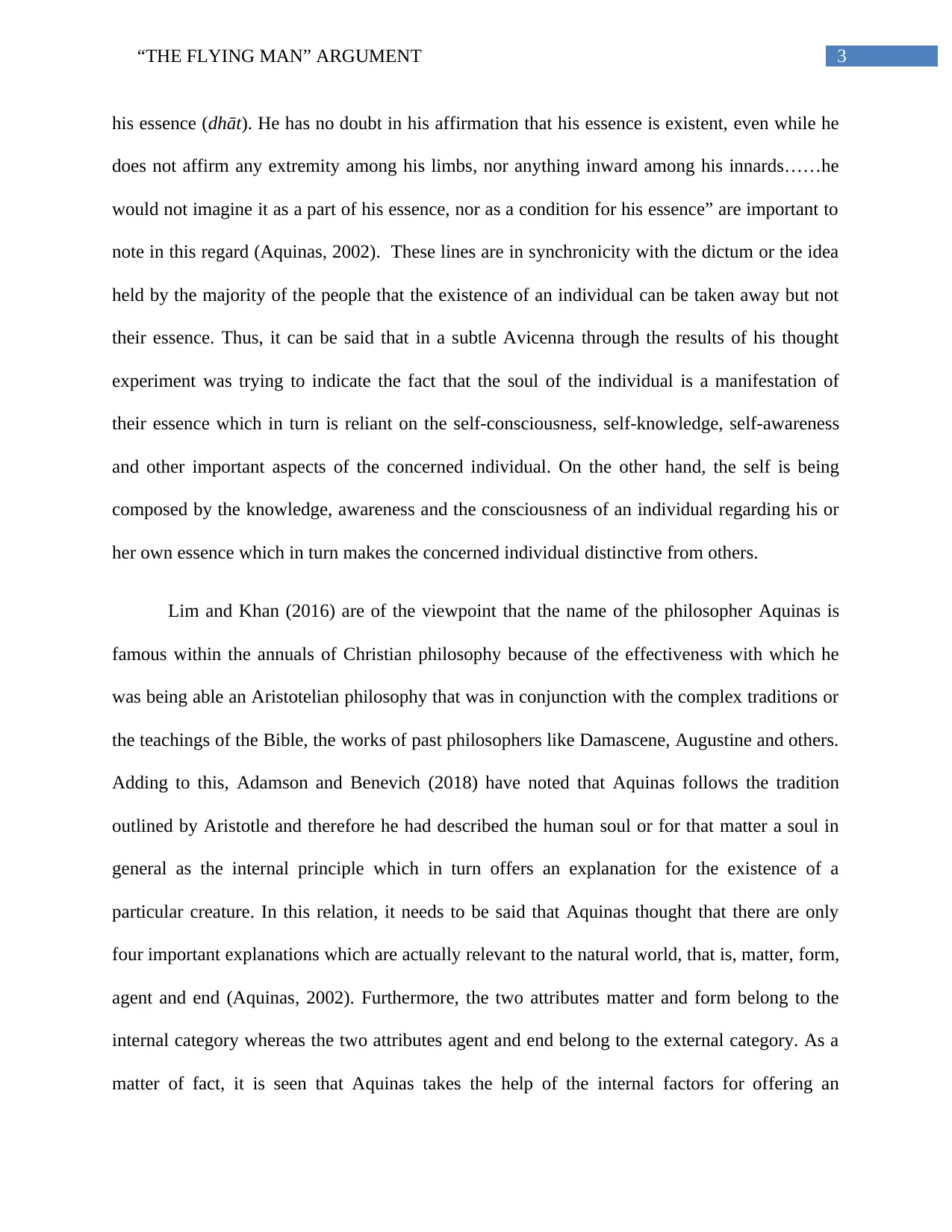
3“THE FLYING MAN” ARGUMENT
his essence (dhāt). He has no doubt in his affirmation that his essence is existent, even while he
does not affirm any extremity among his limbs, nor anything inward among his innards……he
would not imagine it as a part of his essence, nor as a condition for his essence” are important to
note in this regard (Aquinas, 2002). These lines are in synchronicity with the dictum or the idea
held by the majority of the people that the existence of an individual can be taken away but not
their essence. Thus, it can be said that in a subtle Avicenna through the results of his thought
experiment was trying to indicate the fact that the soul of the individual is a manifestation of
their essence which in turn is reliant on the self-consciousness, self-knowledge, self-awareness
and other important aspects of the concerned individual. On the other hand, the self is being
composed by the knowledge, awareness and the consciousness of an individual regarding his or
her own essence which in turn makes the concerned individual distinctive from others.
Lim and Khan (2016) are of the viewpoint that the name of the philosopher Aquinas is
famous within the annuals of Christian philosophy because of the effectiveness with which he
was being able an Aristotelian philosophy that was in conjunction with the complex traditions or
the teachings of the Bible, the works of past philosophers like Damascene, Augustine and others.
Adding to this, Adamson and Benevich (2018) have noted that Aquinas follows the tradition
outlined by Aristotle and therefore he had described the human soul or for that matter a soul in
general as the internal principle which in turn offers an explanation for the existence of a
particular creature. In this relation, it needs to be said that Aquinas thought that there are only
four important explanations which are actually relevant to the natural world, that is, matter, form,
agent and end (Aquinas, 2002). Furthermore, the two attributes matter and form belong to the
internal category whereas the two attributes agent and end belong to the external category. As a
matter of fact, it is seen that Aquinas takes the help of the internal factors for offering an
his essence (dhāt). He has no doubt in his affirmation that his essence is existent, even while he
does not affirm any extremity among his limbs, nor anything inward among his innards……he
would not imagine it as a part of his essence, nor as a condition for his essence” are important to
note in this regard (Aquinas, 2002). These lines are in synchronicity with the dictum or the idea
held by the majority of the people that the existence of an individual can be taken away but not
their essence. Thus, it can be said that in a subtle Avicenna through the results of his thought
experiment was trying to indicate the fact that the soul of the individual is a manifestation of
their essence which in turn is reliant on the self-consciousness, self-knowledge, self-awareness
and other important aspects of the concerned individual. On the other hand, the self is being
composed by the knowledge, awareness and the consciousness of an individual regarding his or
her own essence which in turn makes the concerned individual distinctive from others.
Lim and Khan (2016) are of the viewpoint that the name of the philosopher Aquinas is
famous within the annuals of Christian philosophy because of the effectiveness with which he
was being able an Aristotelian philosophy that was in conjunction with the complex traditions or
the teachings of the Bible, the works of past philosophers like Damascene, Augustine and others.
Adding to this, Adamson and Benevich (2018) have noted that Aquinas follows the tradition
outlined by Aristotle and therefore he had described the human soul or for that matter a soul in
general as the internal principle which in turn offers an explanation for the existence of a
particular creature. In this relation, it needs to be said that Aquinas thought that there are only
four important explanations which are actually relevant to the natural world, that is, matter, form,
agent and end (Aquinas, 2002). Furthermore, the two attributes matter and form belong to the
internal category whereas the two attributes agent and end belong to the external category. As a
matter of fact, it is seen that Aquinas takes the help of the internal factors for offering an
Paraphrase This Document
Need a fresh take? Get an instant paraphrase of this document with our AI Paraphraser
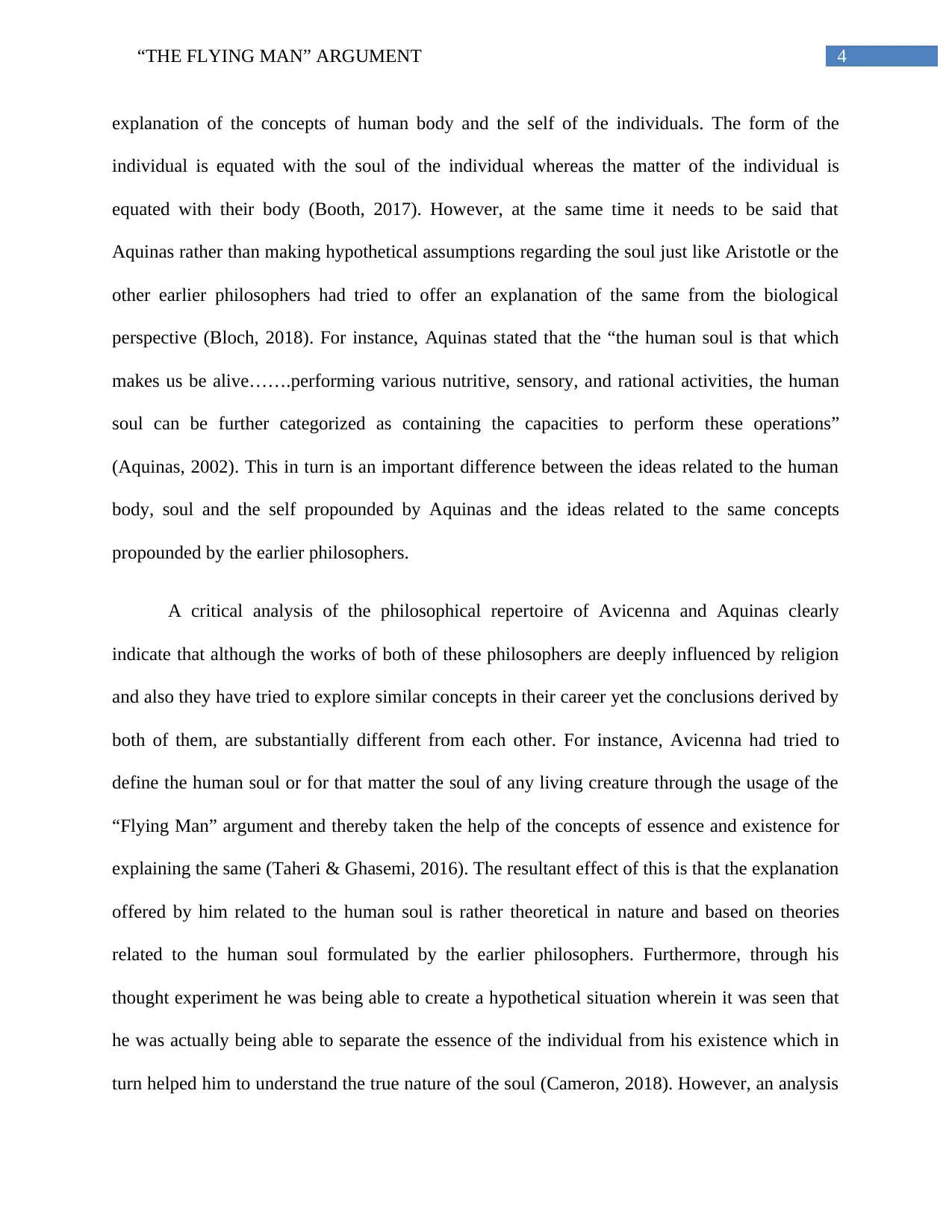
4“THE FLYING MAN” ARGUMENT
explanation of the concepts of human body and the self of the individuals. The form of the
individual is equated with the soul of the individual whereas the matter of the individual is
equated with their body (Booth, 2017). However, at the same time it needs to be said that
Aquinas rather than making hypothetical assumptions regarding the soul just like Aristotle or the
other earlier philosophers had tried to offer an explanation of the same from the biological
perspective (Bloch, 2018). For instance, Aquinas stated that the “the human soul is that which
makes us be alive…….performing various nutritive, sensory, and rational activities, the human
soul can be further categorized as containing the capacities to perform these operations”
(Aquinas, 2002). This in turn is an important difference between the ideas related to the human
body, soul and the self propounded by Aquinas and the ideas related to the same concepts
propounded by the earlier philosophers.
A critical analysis of the philosophical repertoire of Avicenna and Aquinas clearly
indicate that although the works of both of these philosophers are deeply influenced by religion
and also they have tried to explore similar concepts in their career yet the conclusions derived by
both of them, are substantially different from each other. For instance, Avicenna had tried to
define the human soul or for that matter the soul of any living creature through the usage of the
“Flying Man” argument and thereby taken the help of the concepts of essence and existence for
explaining the same (Taheri & Ghasemi, 2016). The resultant effect of this is that the explanation
offered by him related to the human soul is rather theoretical in nature and based on theories
related to the human soul formulated by the earlier philosophers. Furthermore, through his
thought experiment he was being able to create a hypothetical situation wherein it was seen that
he was actually being able to separate the essence of the individual from his existence which in
turn helped him to understand the true nature of the soul (Cameron, 2018). However, an analysis
explanation of the concepts of human body and the self of the individuals. The form of the
individual is equated with the soul of the individual whereas the matter of the individual is
equated with their body (Booth, 2017). However, at the same time it needs to be said that
Aquinas rather than making hypothetical assumptions regarding the soul just like Aristotle or the
other earlier philosophers had tried to offer an explanation of the same from the biological
perspective (Bloch, 2018). For instance, Aquinas stated that the “the human soul is that which
makes us be alive…….performing various nutritive, sensory, and rational activities, the human
soul can be further categorized as containing the capacities to perform these operations”
(Aquinas, 2002). This in turn is an important difference between the ideas related to the human
body, soul and the self propounded by Aquinas and the ideas related to the same concepts
propounded by the earlier philosophers.
A critical analysis of the philosophical repertoire of Avicenna and Aquinas clearly
indicate that although the works of both of these philosophers are deeply influenced by religion
and also they have tried to explore similar concepts in their career yet the conclusions derived by
both of them, are substantially different from each other. For instance, Avicenna had tried to
define the human soul or for that matter the soul of any living creature through the usage of the
“Flying Man” argument and thereby taken the help of the concepts of essence and existence for
explaining the same (Taheri & Ghasemi, 2016). The resultant effect of this is that the explanation
offered by him related to the human soul is rather theoretical in nature and based on theories
related to the human soul formulated by the earlier philosophers. Furthermore, through his
thought experiment he was being able to create a hypothetical situation wherein it was seen that
he was actually being able to separate the essence of the individual from his existence which in
turn helped him to understand the true nature of the soul (Cameron, 2018). However, an analysis
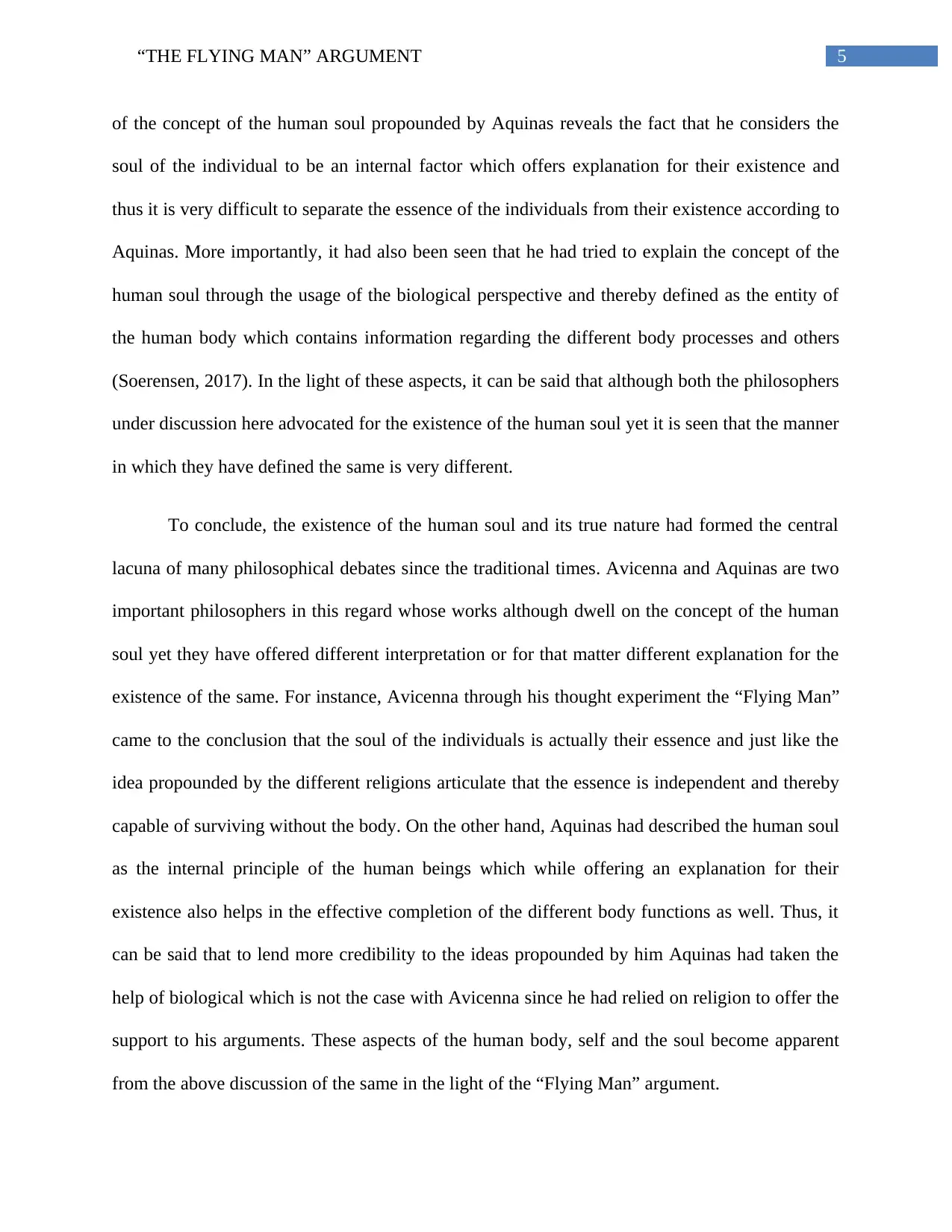
5“THE FLYING MAN” ARGUMENT
of the concept of the human soul propounded by Aquinas reveals the fact that he considers the
soul of the individual to be an internal factor which offers explanation for their existence and
thus it is very difficult to separate the essence of the individuals from their existence according to
Aquinas. More importantly, it had also been seen that he had tried to explain the concept of the
human soul through the usage of the biological perspective and thereby defined as the entity of
the human body which contains information regarding the different body processes and others
(Soerensen, 2017). In the light of these aspects, it can be said that although both the philosophers
under discussion here advocated for the existence of the human soul yet it is seen that the manner
in which they have defined the same is very different.
To conclude, the existence of the human soul and its true nature had formed the central
lacuna of many philosophical debates since the traditional times. Avicenna and Aquinas are two
important philosophers in this regard whose works although dwell on the concept of the human
soul yet they have offered different interpretation or for that matter different explanation for the
existence of the same. For instance, Avicenna through his thought experiment the “Flying Man”
came to the conclusion that the soul of the individuals is actually their essence and just like the
idea propounded by the different religions articulate that the essence is independent and thereby
capable of surviving without the body. On the other hand, Aquinas had described the human soul
as the internal principle of the human beings which while offering an explanation for their
existence also helps in the effective completion of the different body functions as well. Thus, it
can be said that to lend more credibility to the ideas propounded by him Aquinas had taken the
help of biological which is not the case with Avicenna since he had relied on religion to offer the
support to his arguments. These aspects of the human body, self and the soul become apparent
from the above discussion of the same in the light of the “Flying Man” argument.
of the concept of the human soul propounded by Aquinas reveals the fact that he considers the
soul of the individual to be an internal factor which offers explanation for their existence and
thus it is very difficult to separate the essence of the individuals from their existence according to
Aquinas. More importantly, it had also been seen that he had tried to explain the concept of the
human soul through the usage of the biological perspective and thereby defined as the entity of
the human body which contains information regarding the different body processes and others
(Soerensen, 2017). In the light of these aspects, it can be said that although both the philosophers
under discussion here advocated for the existence of the human soul yet it is seen that the manner
in which they have defined the same is very different.
To conclude, the existence of the human soul and its true nature had formed the central
lacuna of many philosophical debates since the traditional times. Avicenna and Aquinas are two
important philosophers in this regard whose works although dwell on the concept of the human
soul yet they have offered different interpretation or for that matter different explanation for the
existence of the same. For instance, Avicenna through his thought experiment the “Flying Man”
came to the conclusion that the soul of the individuals is actually their essence and just like the
idea propounded by the different religions articulate that the essence is independent and thereby
capable of surviving without the body. On the other hand, Aquinas had described the human soul
as the internal principle of the human beings which while offering an explanation for their
existence also helps in the effective completion of the different body functions as well. Thus, it
can be said that to lend more credibility to the ideas propounded by him Aquinas had taken the
help of biological which is not the case with Avicenna since he had relied on religion to offer the
support to his arguments. These aspects of the human body, self and the soul become apparent
from the above discussion of the same in the light of the “Flying Man” argument.
⊘ This is a preview!⊘
Do you want full access?
Subscribe today to unlock all pages.

Trusted by 1+ million students worldwide
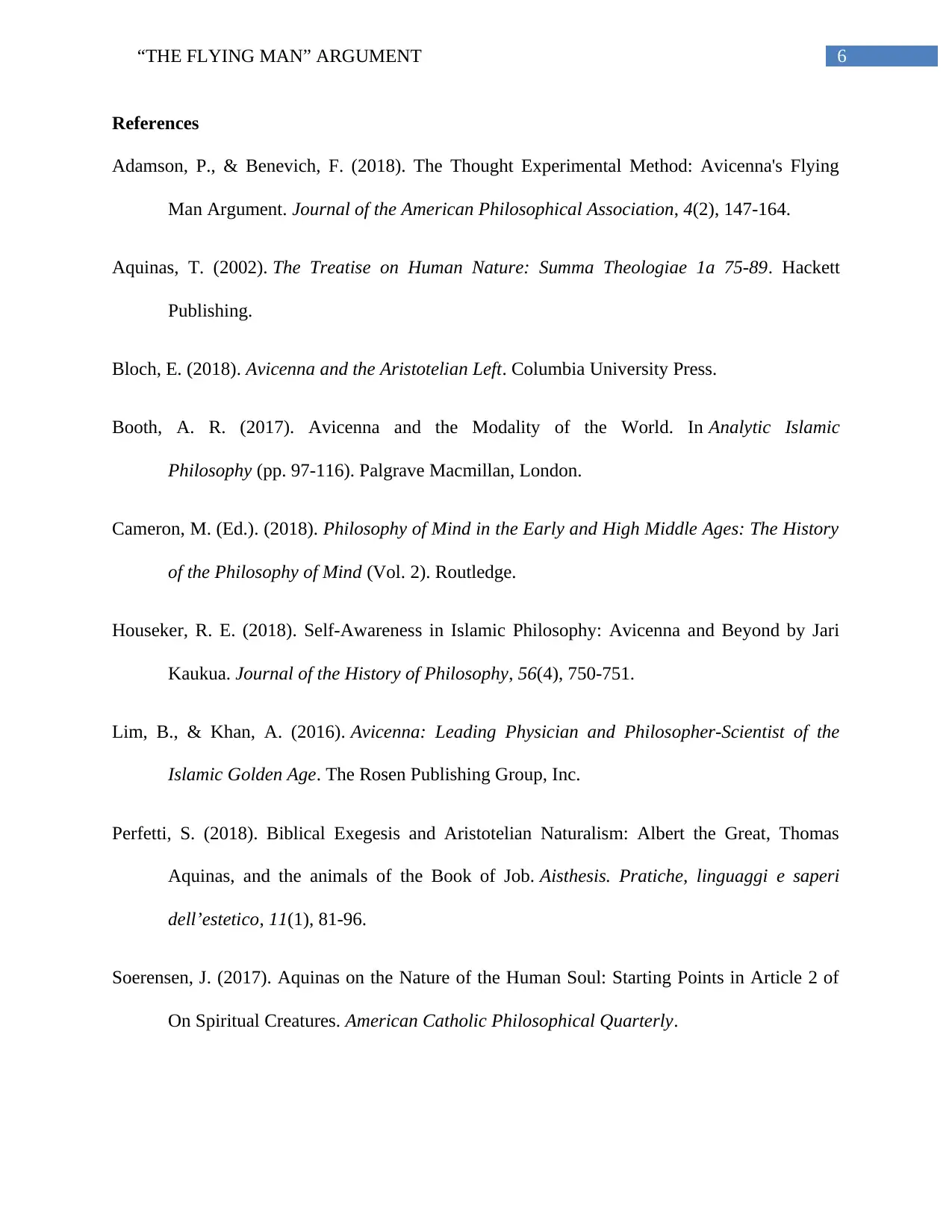
6“THE FLYING MAN” ARGUMENT
References
Adamson, P., & Benevich, F. (2018). The Thought Experimental Method: Avicenna's Flying
Man Argument. Journal of the American Philosophical Association, 4(2), 147-164.
Aquinas, T. (2002). The Treatise on Human Nature: Summa Theologiae 1a 75-89. Hackett
Publishing.
Bloch, E. (2018). Avicenna and the Aristotelian Left. Columbia University Press.
Booth, A. R. (2017). Avicenna and the Modality of the World. In Analytic Islamic
Philosophy (pp. 97-116). Palgrave Macmillan, London.
Cameron, M. (Ed.). (2018). Philosophy of Mind in the Early and High Middle Ages: The History
of the Philosophy of Mind (Vol. 2). Routledge.
Houseker, R. E. (2018). Self-Awareness in Islamic Philosophy: Avicenna and Beyond by Jari
Kaukua. Journal of the History of Philosophy, 56(4), 750-751.
Lim, B., & Khan, A. (2016). Avicenna: Leading Physician and Philosopher-Scientist of the
Islamic Golden Age. The Rosen Publishing Group, Inc.
Perfetti, S. (2018). Biblical Exegesis and Aristotelian Naturalism: Albert the Great, Thomas
Aquinas, and the animals of the Book of Job. Aisthesis. Pratiche, linguaggi e saperi
dell’estetico, 11(1), 81-96.
Soerensen, J. (2017). Aquinas on the Nature of the Human Soul: Starting Points in Article 2 of
On Spiritual Creatures. American Catholic Philosophical Quarterly.
References
Adamson, P., & Benevich, F. (2018). The Thought Experimental Method: Avicenna's Flying
Man Argument. Journal of the American Philosophical Association, 4(2), 147-164.
Aquinas, T. (2002). The Treatise on Human Nature: Summa Theologiae 1a 75-89. Hackett
Publishing.
Bloch, E. (2018). Avicenna and the Aristotelian Left. Columbia University Press.
Booth, A. R. (2017). Avicenna and the Modality of the World. In Analytic Islamic
Philosophy (pp. 97-116). Palgrave Macmillan, London.
Cameron, M. (Ed.). (2018). Philosophy of Mind in the Early and High Middle Ages: The History
of the Philosophy of Mind (Vol. 2). Routledge.
Houseker, R. E. (2018). Self-Awareness in Islamic Philosophy: Avicenna and Beyond by Jari
Kaukua. Journal of the History of Philosophy, 56(4), 750-751.
Lim, B., & Khan, A. (2016). Avicenna: Leading Physician and Philosopher-Scientist of the
Islamic Golden Age. The Rosen Publishing Group, Inc.
Perfetti, S. (2018). Biblical Exegesis and Aristotelian Naturalism: Albert the Great, Thomas
Aquinas, and the animals of the Book of Job. Aisthesis. Pratiche, linguaggi e saperi
dell’estetico, 11(1), 81-96.
Soerensen, J. (2017). Aquinas on the Nature of the Human Soul: Starting Points in Article 2 of
On Spiritual Creatures. American Catholic Philosophical Quarterly.
Paraphrase This Document
Need a fresh take? Get an instant paraphrase of this document with our AI Paraphraser
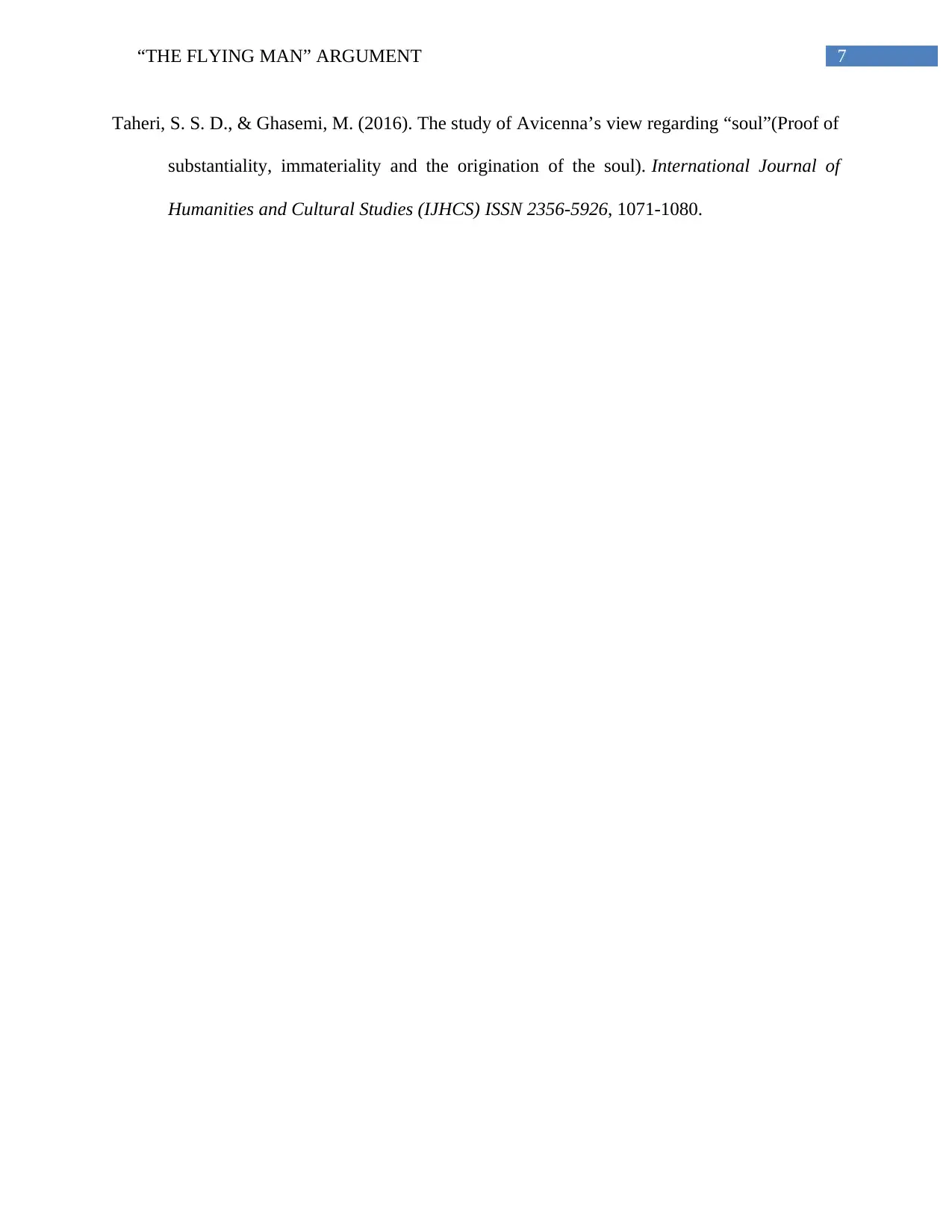
7“THE FLYING MAN” ARGUMENT
Taheri, S. S. D., & Ghasemi, M. (2016). The study of Avicenna’s view regarding “soul”(Proof of
substantiality, immateriality and the origination of the soul). International Journal of
Humanities and Cultural Studies (IJHCS) ISSN 2356-5926, 1071-1080.
Taheri, S. S. D., & Ghasemi, M. (2016). The study of Avicenna’s view regarding “soul”(Proof of
substantiality, immateriality and the origination of the soul). International Journal of
Humanities and Cultural Studies (IJHCS) ISSN 2356-5926, 1071-1080.
1 out of 8
Related Documents
Your All-in-One AI-Powered Toolkit for Academic Success.
+13062052269
info@desklib.com
Available 24*7 on WhatsApp / Email
![[object Object]](/_next/static/media/star-bottom.7253800d.svg)
Unlock your academic potential
Copyright © 2020–2026 A2Z Services. All Rights Reserved. Developed and managed by ZUCOL.





